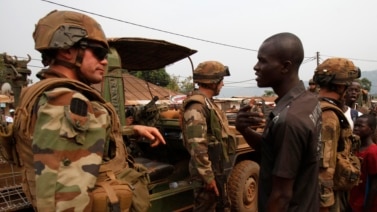
The International Crisis Group reported last month that a hidden conflict is taking place in rural parts of the Central African Republic. The conflict is between cattle herders and farmers. The herders are mostly Muslims from the Peul ethnic group. Most of the farmers are either Christians or animists. Animists believe that animals, plants and other things in nature have spirits just as human beings do.
Officials are attempting to stop the conflict and to prevent new violence in the country.
A group of livestock experts recently visited rural parts of the Central African Republic. The group included representatives of a national alliance of cattle herders, international aid groups, the United Nations and government agencies. The experts found that cattle growers and their animals are generally not welcome in agricultural areas. Clashes develop when the growers come under attack. The farmers attack the herders, who then answer with their own attacks.
Very often, the clashes take on religious or ethnic overtones. One side attacks the other for what appears to be religious or ethnic reasons.
Some people displaced by the unrest live at a camp in the town of Bambari. They say they fled there because of attacks by Peuls.
This man -- Yagbanga Vianney -- says Christians like him are being hurt because the Peuls are attacking Christians. He says that is why they sought protection at the camp.
The Central African Republic has a population of five million. Most of them are Christian. The Peuls are usually Muslim.
Aid workers say about 1,000 Christians have been coming to Bambari every week to escape dangerous conditions in their home villages. The attacks on villages are often designed to answer violence against the Peuls.
Nguere Bissekoa told VOA that the Peuls attacked his village and burned many houses. He says the attackers thought the area was occupied by Christian and animist militias known as anti-balaka.
The violence around Bambari has mainly happened on two roads leading south. These roads appear to be the front lines between the anti-balaka and the Peuls. Many of the Peuls have been forced from land where their animals once fed.
Much of Bambari is under the control of a militia leader named Ali Darassa. He has created a movement called the Union for Peace in the CAR, or UPC. Those letters come from the French name for the group.
Captain Ahamat Nedjad is a spokesman for the group. He blamed the anti-balaka for most of the burned villages. But he admitted that the Muslims have sometimes used violence to answer the attacks.
However, he says even if Muslims sometimes burn a village they have a reason to do so. He says if the Christian militia group did not attack Peuls, Muslims would not answer with violence.
In the Central African Republic, cattle often move from north to south at this time of year. Livestock experts are warning there could be more violence during this seasonal migration. The group says the government should place peacekeeping troops near the border with Chad to help reduce violence. It also says that providing vaccination services for cattle might persuade herders to follow suggested trails instead of having their animals walk on farmland and crops.
I’m Christopher Cruise.
Correspondent Nick Long reported this story from Bambari, Central African Republic. Christopher Cruise wrote it for VOA Learning English. George Grow was the editor.
Words in This Story
livestock – n. farm animals (such as cows, horses, and pigs) that are kept, raised and used by people
overtones – n. an idea or quality that is suggested without being said directly
migration – n. the movement from one area to another at different times of the year
vaccination – n. medicine that prevents infection by a disease
Are there conflicts between farmers and herders in your country? Are there religious conflicts in your country? If so, how are officials dealing with them? We want to hear from you. Write your thoughts in the comments section.

